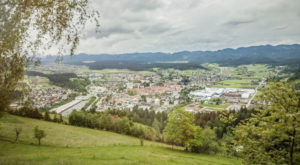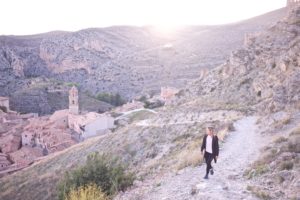“My ideal mountain area is a lively place and a well-populated community of people” explained a young graduate from Slovenian Carinthia. The desire for a dynamic mountain life and vibrant villages is a constant in Euromontana’s new study on mountain youth. But do young people want to live or settle in the mountains? How can policies make mountain areas attractive? As the European Year of Youth starts, Euromontana, the European Association of Mountain areas, provides an insight of young people’s appetite for life in the mountains and draws some lessons for the future attractiveness of these regions.
– Quote taken from a new European wide report on mountain youth produced by Euromontana, the European Association of Mountain areas.

A high angle view of the Slovenj Gradec, Carinthia region, Slovenia. © Shutterstock Wirestock Creators
Insight into attractiveness through data analysis
Across Europe, 66% of young mountain people say they want to continue living in the mountains in the future, particularly valuing the quality of life and the contact with nature. This statistic may only be made more relevant since the onset of the COVID-19 pandemic. For example, of the young people who do not live permanently in the mountains but often go there perhaps to visit family or to go hiking, 5% told us that in the future they would like to live in the mountains and that this desire was greatly influenced by the COVID-19 crisis. This rate is even higher when looking at the national level: 13% of young people in Romania and 17% in Italy desired this life plan since the pandemic. From these numbers, it is possible that widespread teleworking contributes to this trend, though these practices are not applicable to all activity sectors.
This is a significant finding, knowing that the drain of young people out of the mountains heading for larger centers cities represents a major challenge for mountain areas. Many mountain regions are already considered as sparsely populated, as in Spain or Greece, and a 2020 report foresees demographic decline will affect other areas in the future, such as the Massif Central (France) or the Romanian Carpathians.
Mobility and education: key challenges in the mountains
One of the striking dichotomies in this study is that young people tell us on the one hand that they want to continue to live in the mountains because they enjoy the quality of life there yet significant levels of dissatisfaction exist over the provision of services.
Mobility, for example, is a crucial issue in the mountains. Due to the natural constraints and sometimes the great distances to be covered, mobility challenges can dampen the overall quality of life. For example, 52% of young mountain reported that, in their region, the public transport offered is either unsatisfactory or non-existent, and this rises to 67% in Italy and up to 91% in Norway.
Our study found that education is another priority for young people. Access to education and training, both initial and lifelong, is considered very poor by our respondents. 73% of young people from Romanian mountains tell us they can barely access educational opportunities in their region. In other countries, such as Italy, Norway or Spain, this represents half of young respondents. How then can the attractiveness of a territory be maintained if young people have no choice but to study elsewhere? How can we encourage them to come back once they have graduated?

Ensuring political impact
As we make our way through 2022, the European Year of Youth, our report on mountain youth should provide an insight for decision makers at all levels. Young people are a chance for mountain territories to avoid falling into an endless circle of depopulation and socio-economic decline.
Many young people want to leave their mountain area temporarily, or are forced to do so, especially to study elsewhere. Territories must therefore develop territorial attractiveness strategies that take into account the full life cycle of their residents. In particular, this means supporting the creation of qualified jobs and the installation of infrastructures useful for young workers, such as adequate transportation, co-working spaces, and childcare facilities.
The coming years will also tell whether more young people moved to mountain villages as a result of the COVID-19. The European Rural Observatory, whose creation has been announced in the European Union Communication on the Long-Term Vision for Rural Areas, should help in providing data on post-COVID-19 population movements and in analysing which territories benefit from them.
Policy makers at all levels must commit to the concrete implementation of this Vision. In particular, it is essential to address the issue of “brain drain” by developing training opportunities outside the main urban centres and by attracting talent to rural and mountainous areas.
Note:
These issues will be further explored by mountain stakeholders at the XII European Mountain Convention, on “Smart mountains: how to make our territories attractive and future-oriented?”, which will take place on 25-26-27 October 2022 in the Italian Natural Park and Biosphere Reserve of Sila.

Blandine Camus (Twitter @CamusBlandine) is a Communication and Policy Officer for Euromontana. Euromontana is the European multisectoral association for co-operation and development of mountain territories. It embraces regional and national mountain organisations throughout greater Europe, including regional development agencies, local authorities, agriculture organisations, environmental agencies, forestry organisations and research institutes.
Are you currently involved with regional research, policy, and development? The Regional Studies Association is accepting articles for their online blog. For more information, contact the Blog Editor at rsablog@regionalstudies.org.